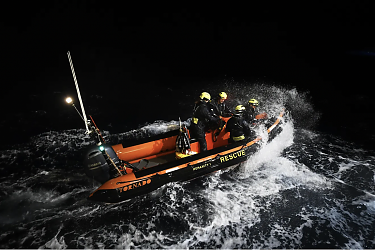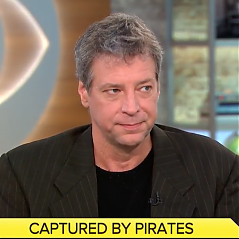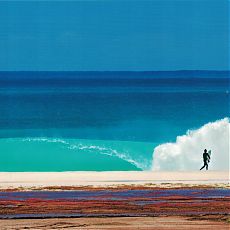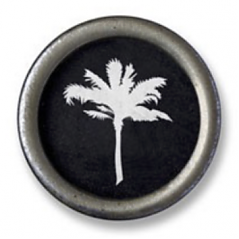Battleships Off Somalia
Europe and America have different interests in the counter-piracy game.
November 2009
Navies are expensive, and sending warships to Somalia is a hugely inefficient way to fight pirates, considering that the number of successful attacks off the Somali coast this year — 35 by mid-November — is only seven below the total for all of 2008, before NATO and the EU had anti-pirate missions in the region.
So why are they there? The short answer is that Western governments don’t know what else to do. But the U.S. and Europe also have different self-interested reasons to cruise the Indian Ocean.
For most of the European governments involved, the obvious idea is to protect their domestic shipping business. “For these big shipping nations, it’s not a big deal,” a Horn of Africa expert named E.J. Hogendoorn, at the International Crisis Group in Nairobi, told me in September. “They’ve got big shiny navies; what the hell are they gonna do with ‘em anyway? Might as well park ‘em off the coast of Somalia. It’s as good a training as any.”
And defending the sea lanes is more or less what everyone’s claiming to do. But America’s interest is more complicated. In spite of the dramatic rescue of the U.S.-flagged Maersk Alabama last April, the ocean isn’t terribly crowded with American merchant vessels. (Even American shipping lines sail under foreign flags, to save money.) The real draw to this part of the world, for Washington, is counterterrorism.
The Navy won’t say so. “Piracy’s an international problem requiring an international solution,” said Lt. Matt Allen, a spokesman for the Fifth Fleet in Bahrain, where the separate U.S.-led counterpiracy coalition (Combined Task Force 151) is based. “Even though a small portion of the [merchant] vessels are U.S.-flagged, a majority are allies and friends. Every nation has a vested interest in insuring the safe passage of the sea lanes.”
But Washington’s military buildup on the Horn of Africa started with the war in Afghanistan, which led to a (still-growing) naval base in Djibouti, just north of Somalia. Officially, the base in Djibouti has nothing to do with pirates. It’s lodged inside what the Pentagon calls an “Arc of Instability” stretching from Kenya to Yemen. Al-qaeda and some like-minded groups have civil wars running in Yemen, Somalia and Sudan — and Somalia, of course, could become “the next Afghanistan” if Islamists like al-Shabaab take over. Washington wants to watch these developments.
In September, a small American team killed a long-wanted terrorist named Saleh Ali Saleh Nabhan south of Mogadishu, which suggests that the Pentagon has good intelligence in the region. No one in Djibouti, Bahrain or the AFRICOM headquarters in Germany will admit to organizing the raid, but Special Forces from an American warship reportedly helped, which might indicate a measure of support from the Navy’s counterpiracy base in Bahrain (since the Djibouti base doesn’t send out warships, officially).
The Navy’s new jet-sized surveillance drones based in the Seychelles — officially to watch pirates — also have more than enough range to glide over Somalia and the rest of the Pentagon’s “Arc of Instability.”
But there’s a third interest at stake in the fish-rich Indian Ocean. Some European fishing boats wander down from the Mediterranean (and away from hated EU regulations) to trawl the lawless coast of Somalia for tuna, lobster, shrimp and shark.
“It is particularly ironic that many of the nations that are presently contributing warships to the anti-piracy flotillas patrolling, or set to patrol, the waters off the Horn of Africa, are themselves directly linked to the foreign fishing vessels that are busily plundering Somalia’s offshore resources,” Clive Schofield, an Australian research fellow at the University of Wollongong and author of a paper called Plundered Waters: Somalia’s Maritime Resource Insecurity, has written.
Namely: France and Spain. Hogendoorn, at the International Crisis Group, singled out Spain. “I’ve spoken to diplomats in Europe who’ve made it quite clear that Spain has been very active in the piracy issue because of its own national interests,” he said, “which can only be interpreted to mean that they have fishing vessels making lots of money off of fishing in Somali waters.”
Decimation of Somali fishing is a major complaint of the pirates themselves. The notion of a Somali fisherman hijacking a cargo ships because of collapsing fish populations is over-simple — piracy is organized crime — but the complaints about systematic decimation of African fish is real. Many Somalis, in fact, think the warships they see from their beaches have arrived to make the seas safe for foreign boats.
Aboard a NATO frigate in September, a British officer, Lt. Cmdr. Graham Bennett, noticed the lack of fishermen out on a calm, sunny day. It was the start of fishing season in the Gulf of Aden — the monsoons had just ended — but Somali fishermen seemed to be staying home.
“We need to get the word out that we’re not here to arrest everyone,” he told me. “We got on Somali TV the other day [and] said we really do want to protect the fishermen themselves from piracy. But some of the Somali people thought we were just here to protect the European fishing trawlers. That surprised us a little.”
Michael Scott Moore

Rafts of the Medusa
Why every day on the Mediterranean is a new scandal for Europe. For both Foreign Policy and Die Zeit.
California’s Attempt at Land Reparations
How land seized from a Black family 100 years ago may be returned. The Bruce’s Beach story from a hometown angle, for The New Yorker
Day of the Oprichnik, 16 Years Later
The novelist Sorokin, the president Putin, his man Dugin, and the war in Ukraine. For n + 1.

The Rushdie Narrative
Knife and the crumbling ground beneath free speech
There Must Be Some Way Out of Here
An essay on Bob Dylan, “All Along the Watchtower,” and Somali pirate captivity.
That Mystic Shit
The life of Lou Reed in two biographies

Cambodian Seafarers Talk About Pirates
Mike visits Cambodia for The New Yorker to talk about a harrowing shared experience in Somalia
The Muslim Burial
Cambodian hostages remember digging a grave for one of their own. A sequel chapter to The Desert and the Sea
The Real Pirates of the Caribbean
Adventure journalism in Southern California. A travel essay for The Paris Review.

Antifa Dust
An essay on anti-fascism in Europe and the U.S., for the Los Angeles Review of Books
Was Hitler a Man of the Left?
A book that helped Republicans in America lose their damn minds.
Ghosts of Dresden
The Allied firebombing of Dresden in 1945 destroyed the baroque center of what Pfc. Kurt Vonnegut called, in a letter home from Germany, “possibly the world’s most beautiful city.”

George Freeth, Biographed
The first academic treatment of America’s surf pioneer. Also, was Freeth gay?
It’s Called Soccer
Americans live on what amounts to an enormous island, defended on two shores by the sea, and we’ve evolved a few marsupial traditions that nobody else understands.
Tilting at Turbines (in the Severn River)
The morning was clear and cold, with frost on the church steeple and the cemetery grass. I had a quick English breakfast at a white-cloth table, in my wetsuit, and drove to Newnham, a village on the Severn River in Gloucestershire, parking near the White Hart Inn.

The Curse of El Rojo
I’d packed the car lightly — a bag of clothes, a bag of cassette tapes, a backpack of books, a few essential tools.

































